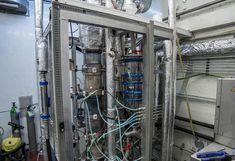In the Paris COP-21 summit, a below +2°C climate change goal was agreed among the countries. If the associated CO2 emission reduction is to be met, immediate action is required on the policy level and also on the technological level. It is likely that a mix of technologies will lead to economically optimized solutions of the overall problem. One part of such a mix is to prevent CO2 emissions from power generation and industry by capturing CO2 and storing it in safe geologic formations. Since CO2 storage is seen critically in Austria, research at BOKU focuses on efficient capture processes and on alternative carbon storage concepts.
Current research initiatives and projects:
(For further information, please click on the images)
ViennaGreenCO2
Energy efficient CO2 capture and carbon neutral CO2 supply chain for greenhouse fertilization at Wien Simmering
A novel CO2 capture technology based on continuously operated temperature swing adsorption (TSA) using solid amine sorbents in multi-stage fluidized bed columns is investigated. The technology promises energy and cost efficiency increase compared to conventional CO2 capture technology based on liquid amine scrubbing.
The role of BOKU’s ETEM team within the consortium is to investigate the critical issue of heat transfer to shallow fluidized beds of Geldart Type B particles, to study the adsorption equilibria of CO2 and H2O for the selected materials, to assess and optimize heat integration for the capture plant including heat pump technology, and to support pilot plant operation at Vienna Simmering.
BioCharNetSinks
Establishment of sustainable net CO2 sinks through pyrolysis of residual biomass and black carbon storage in soils - Pyrolysis of cotton stalks and the use of pyrolysis char as soil additive
In cooperation with the Research Group Process Engineering of Renewable Resources of the institute, a process route for typical ligno-cellulosic by-products of agricultural production systems is investigated, which allows for quasi-permanent storage of about 50% of the carbon from the input stream. Given the fact that this carbon has been taken up by green plants from the atmosphere just before and potential positive added effects through nutrient recycling to the soil, the approach can be a potentially cost-effective long-term contribution to CO2 emission reduction.
SUCCESS
Chemical looping combustion (CLC) - Industrial steam generation with 100% carbon capture and insignificant efficiency penalty - Scale-Up of oxygen Carrier for Chemical-looping combustion using Environmentally SuStainable materials
The core idea of the EU FP-7 project SUCCESS is to provide a rigorous scale‐up solution to gaseous fuel chemical looping combustion (CLC) covering both the scale‐up of the CLC plant technology and the scale‐up of oxygen carrier manufacturing technology to industrial scale.
The role of BOKU’s ETEM team within the consortium is to provide efficiency figures based on comprehensive process models, to compare the discussed process options with competing technologies and to contribute to targeted process optimization.


![[Translate to English:] ViennaGreenCO2 © Anna Katharina Aschauer (CC BY-ND)](/fileadmin/_processed_/3/1/csm_Anlage_Floz_9b19d210ed.jpg)
![[Translate to English:] BioCharNetSinks © Tobias Pröll (CC BY-ND)](/fileadmin/_processed_/2/3/csm_biocharnetsinks_0a0d510b0e.png)
![[Translate to English:] SUCCESS © Tobias Pröll (CC BY-ND)](/fileadmin/_processed_/4/9/csm_success_516112f43e.png)